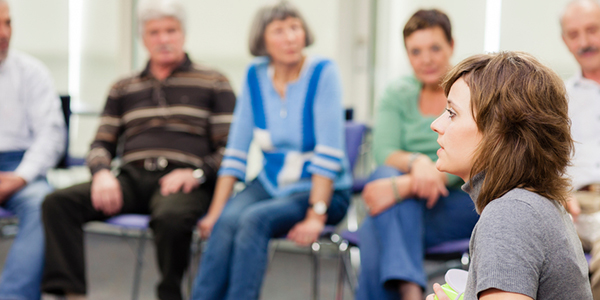When you are diagnosed with cancer there is not one part of your life that seems untouched, including your personal relationships. There is a great deal to process when working through diagnosis and treatment. Your daily routine and quality of life changes in several ways as you manage doctor’s appointments, medical insurance, enduring and recovering from treatments, among other challenges. You also may know how your family and loved ones are also affected by your diagnosis and treatments.
While you are the one who is carrying the burden of living with cancer, your loved ones also experience the strain of watching someone they deeply care for endure the challenges of treatment and recovery. Cancer support groups offer a refuge for you and your loved ones to work through these challenges.
Table of Contents
The Impact of Cancer Diagnosis on the Individual and Family
A cancer diagnosis affects the social, emotional, spiritual and physical well-being of not only the person diagnosed but also their friends and family. If you have been recently diagnosed with cancer, you may have experienced feelings like disbelief, denial, numbness, and extreme anxiety. It is not uncommon to have waves of emotions similar to grief or mourning with periods of extreme sadness, anger, and depression followed by periods of calmness. The psychological and physical repercussions of living with a serious illness like cancer include:
- Extreme distress about diagnosis
- Anxiety and depression
- Worsening of quality of life
- Physical discomfort of treatment
- Fatigue and exhaustion (emotional and physical)
Caregivers experience alleviated levels of fatigue and stress due to having to care for a loved one. Spouses or partners also live with worry and anxiety associated with the fear of losing their loved one to cancer. Beyond the fear of loss, watching someone they love suffer during treatment and recovery from surgery can be very difficult to manage. The traumatic experience of cancer leaves a mark even after recovery and during remission. People who have fully recovered from cancer often deal with emotional, physical, and psychological repercussions of surviving cancer.
Fear and Loss
One of the most trying aspects of a cancer diagnosis is the foreboding feeling of fear and anxiety connected to loss. Cancer patients experience different levels of fear and loss, including:
- Fear of pain and suffering
- Fear of the unknown
- Fear of abandonment
- Loss of control
- Loss of identity
- Loss of close relationships
- Loss of body image
- Loss of hope
All people touched by a cancer diagnosis may live with these feelings, but in different ways. If you are currently living with cancer, you may be anxious about the future and the unknown prospects of what treatments will feel like and if they will be effective in beating the cancer. Your loved ones most likely are worried about the unknown as well, especially concerned about if they will lose you to cancer. You may be afraid of the pain and suffering that is ahead of you or that you will lose control of your life.
Both your loved ones and you may be afraid that your relationship will change and you may grow alienated from each other. These fears are normal and valid for both the person dealing with cancer and their loved ones. However, the person living with cancer and anyone touched by the diagnosis do not have to work through these feelings alone or without the support of a healthy community. Cancer support groups are an ideal place to reach out to seek answers and receive care and encouragement in a safe place.
Caregivers
If you are a caregiver of someone with cancer, you have chosen to help a person with cancer manage daily activities while going through treatment and recovery. What a rewarding and necessary commitment you have made! Your service is valuable, especially considering the need for a person with cancer to have emotional support, assistance with completing daily tasks, and help with coordinating appointments and other services. These acts of service can become challenging and you may struggle with managing the psychological and physical effects of caring for someone else.
If you find that the stress is overwhelming or you are experiencing caregiver fatigue, consider joining a support group. Cancer support groups specifically geared towards caregivers can offer you a place to receive the following:
- Fresh ideas on how to cope with stress and fatigue
- Access resources in self-care and mental health
- Share advice on how to manage obstacles and challenges
- Express frustrations, anger, and other emotions
These support groups offer you an opportunity to meet other people who are also caregiving to help you know that you are not alone.
Family or Loved Ones
Having a family member with cancer is difficult in so many ways. You are faced with an overwhelming concern for your loved one and know you need to support and care for them without revealing your deepest fears and anxieties. Many family members will act as a caregiver for their loved one, adding to the emotional impact that cancer has on the individual. Your love and support are incredibly important to the physical and emotional wellbeing of your family member who is battling cancer. However, it is not easy to carry the burden of providing support alone. Joining a support group specifically for family members or loved ones of someone with cancer can help you cope with the feelings you are experiencing in a safe space free of criticism and judgment.
Spouses or Partners
No matter how strong your relationship with your partner is, cancer will have an impact. If you are a spouse or partner of someone recently diagnosed with, currently treated or recovered from cancer, know there is a support group available to you to receive guidance and support. You can attend a cancer support group that is for spouses only or you can ask to join a support group that helps you both as a couple. Challenges that may come up during this time include:
- Managing feeling that come up alone or between the both of you
- Changes to your social life
- Making decisions
- Knowing how support your partner
- Communication issues
- Changes in daily routine
- Relationship challenges (for example, intimacy and sex)
Joining a support group can help you come up with strategies in how to cope and work through the many challenges you face. You can express emotions, doubts, and fears in a group moderated by a professional who can offer you therapeutic advice. Support groups also have resources to help you as a partner or spouse learn about the specific type of cancer you have, thus increasing your knowledge and ability to be your partner’s health advocate.
Individual with Cancer
While your family, friends, and partner may be dealing with the impact of your cancer diagnosis, you are personally burdened with the weight of having to accept and endure what is ahead of you. Your loved ones are an important source of support, but you may find that you need something more. Cancer support groups offer many benefits that your loved ones are not able to provide, such as:
- Emotional support
- Educational resources
- Social support
- Therapeutic advice from professionals
Cancer support groups are typically led by licensed therapists or social workers, trained cancer survivors, or oncology professionals. These leaders offer a rich resource of information and expertise in the field of oncology allowing you the opportunity to ask questions and receive advice about managing living with cancer. Most importantly, in these support groups you develop relationships with people who are going through a similar life situation which allows you a space to open up about subject matter you do not feel comfortable discussing with your loved ones.
Studies show that all people touched by cancer benefit from participating in cancer support groups, yet few people choose to join them. People who regularly attend support groups show improved coping mechanisms and quality of life along with improved mental health. If you or your loved one has recently been diagnosed with cancer, consider looking for a support group to help you manage the changes that are to come.
References
Cipolletta, S., Simonato, C. & Faccio, E. (2019, February 18).The Effectiveness of Psychoeducational Support Groups for Women With Breast Cancer and Their Caregivers: A Mixed Methods Study. Frontiers in Psychology, 10, 288. Retrieved from PMC: https://www.ncbi.nlm.nih.gov/pmc/articles/PMC6387958/
Gorman, L. M. (2006). Psychosocial Nursing Care Along the Cancer Continuum. Oncology Nursing Society, Pittsburg, PA. Retrieved from Oncology Nursing Society: https://www.ons.org/sites/default/files/publication_pdfs/Sample%20Chapter%200554%20PsyNsgCare2nd.pdf
Grande, G. E., Myers, L. B., & Sutton, S. R. How do patients who participate in cancer support groups differ from those who do not? Psycho-Oncology, 15(4), 321-334. Retrieved from WIley Online: https://onlinelibrary.wiley.com/doi/10.1002/pon.956
National Cancer Institute Writing Staff. (2018, September 26). Facing cancer with your spouse or partner. Retrieved from NIH: https://www.cancer.gov/about-cancer/coping/adjusting-to-cancer/spouse-or-partner
Worrall, H., et., al. (2018, January 01). The effectiveness of support groups: a literature review. Faculty of Science, Medicine and Health Papers, Part A. Retrieved from University of Wollongong Research Online: https://ro.uow.edu.au/cgi/viewcontent.cgi?article=6502&context=smhpapers






